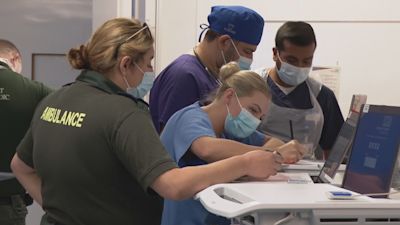Nurse cries after shift as Basingstoke Hospital faces 'perfect storm'

A nurse has told of how she has sometimes cried at the end of her shift, as the NHS continues to work against a 'perfect storm' of staff shortages and coronavirus.
In the Acute Assessment Unit (AAU) at Basingstoke Hospital in Hampshire, staff are battling high demand and patient turnaround is limited, with nearly every bed full. Patients are brought here from A&E before being transferred to another ward.
Katherine Rooks-Taylor, deputy sister at the AAU said: "It's always non-stop here, prior to Covid, but since Covid we've had a lot more admissions, a lot more acutely unwell patients that we are trying to manage.
"With the lack of staff at the moment, it is becoming increasingly difficult. There are days when you leave and you feel like 'I haven't done my best' and you end up having a little cry at the end of the day. You obviously just want to do the best you can for your patients."
Katherine says the demand is stressful, but the team are working together to pull through
Downstairs in the hospital's Accident and Emergency department, Monday saw the busiest day for staff, with over 270 people coming in for help.
A combination of patients with extreme illness, staff shortages, and coronavirus has created a 'perfect storm', according to the matron of Basingstoke's A&E department.
With some people waiting up to nine hours to be seen, Julie-Anne Fulford says it is important that people consider whether they need to go to A&E for treatment.
Ms Fulford said: "So because we're seeing so many patients at the department, it gets really challenging when we want to provide the care that we're used to giving."
Julie-Anne Fulford, A&E Matron, says the public need to consider if they can seek help elsewhere before going to the emergency department
She added: "When you've got patients waiting in the department between four and nine hours, it gets increasingly difficult to see the woods for the trees. We really need patients to self help at home, we need patients to access their GPs, and also use services like 111, and then come to ED for those real, true accidents or emergencies.
"If we're having to spend time looking after patients who could have accessed those different services, then it gives us less time to see and treat the patients who truly need to be here."
Across Hampshire and the Isle of Wight, more than 650 people with COVID-19 are being cared for in hospital, 2.5 times higher than in early January. Meanwhile more than 2,800 staff working for the NHS are off sick, with almost half due to COVID-19.
To ease the pressure on staff and allow for beds to be made available, the community is being called upon to help.
Dr Lara Alloway, the chief medical officer for Hampshire Hospitals Foundation Trust said: "People who have loved ones in hospital, if they're able to help us by staying in close contact so when their loved one is ready to go home, we can arrange for them to be discharged as soon as possible."
"We're just keeping people in our hospitals when they need to be in hospital, and it is much nicer for people to be at home at all other times. There is a rare time where people at home will be more vulnerable and we need to make sure that we think about that, but when we're asking for patients to be discharged, it is because we think it is safe to do so."